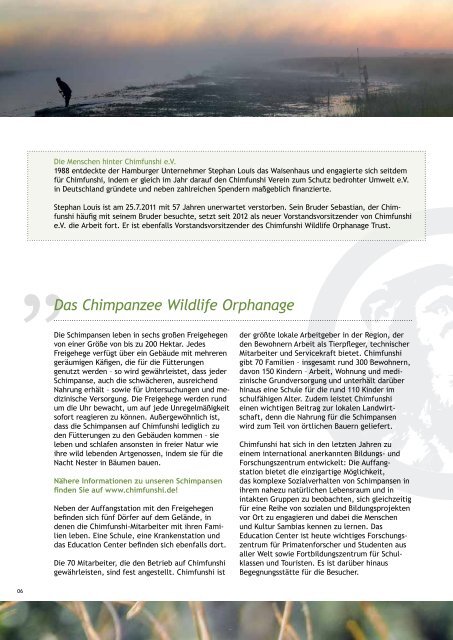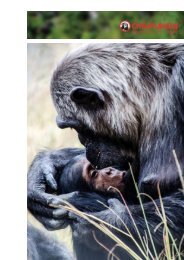Chimfunshi Booklet
Imagebroschüre von Chimfunshi Deutschland e.V. mit Informationen in Deutsch und Englisch.
Imagebroschüre von Chimfunshi Deutschland e.V. mit Informationen in Deutsch und Englisch.
Erfolgreiche ePaper selbst erstellen
Machen Sie aus Ihren PDF Publikationen ein blätterbares Flipbook mit unserer einzigartigen Google optimierten e-Paper Software.
Die Menschen hinter <strong>Chimfunshi</strong> e.V.<br />
1988 entdeckte der Hamburger Unternehmer Stephan Louis das Waisenhaus und engagierte sich seitdem<br />
für <strong>Chimfunshi</strong>, indem er gleich im Jahr darauf den <strong>Chimfunshi</strong> Verein zum Schutz bedrohter Umwelt e.V.<br />
in Deutschland gründete und neben zahlreichen Spendern maßgeblich finanzierte.<br />
Stephan Louis ist am 25.7.2011 mit 57 Jahren unerwartet verstorben. Sein Bruder Sebastian, der <strong>Chimfunshi</strong><br />
häufig mit seinem Bruder besuchte, setzt seit 2012 als neuer Vorstandsvorsitzender von <strong>Chimfunshi</strong><br />
e.V. die Arbeit fort. Er ist ebenfalls Vorstandsvorsitzender des <strong>Chimfunshi</strong> Wildlife Orphanage Trust.<br />
Das Chimpanzee Wildlife Orphanage<br />
Die Schimpansen leben in sechs großen Freigehegen<br />
von einer Größe von bis zu 200 Hektar. Jedes<br />
Freigehege verfügt über ein Gebäude mit mehreren<br />
geräumigen Käfigen, die für die Fütterungen<br />
genutzt werden – so wird gewährleistet, dass jeder<br />
Schimpanse, auch die schwächeren, ausreichend<br />
Nahrung erhält – sowie für Untersuchungen und medizinische<br />
Versorgung. Die Freigehege werden rund<br />
um die Uhr bewacht, um auf jede Unregelmäßigkeit<br />
sofort reagieren zu können. Außergewöhnlich ist,<br />
dass die Schimpansen auf <strong>Chimfunshi</strong> lediglich zu<br />
den Fütterungen zu den Gebäuden kommen – sie<br />
leben und schlafen ansonsten in freier Natur wie<br />
ihre wild lebenden Artgenossen, indem sie für die<br />
Nacht Nester in Bäumen bauen.<br />
Nähere Informationen zu unseren Schimpansen<br />
finden Sie auf www.chimfunshi.de!<br />
Neben der Auffangstation mit den Freigehegen<br />
befinden sich fünf Dörfer auf dem Gelände, in<br />
denen die <strong>Chimfunshi</strong>-Mitarbeiter mit ihren Familien<br />
leben. Eine Schule, eine Krankenstation und<br />
das Education Center befinden sich ebenfalls dort.<br />
Die 70 Mitarbeiter, die den Betrieb auf <strong>Chimfunshi</strong><br />
gewährleisten, sind fest angestellt. <strong>Chimfunshi</strong> ist<br />
der größte lokale Arbeitgeber in der Region, der<br />
den Bewohnern Arbeit als Tierpfleger, technischer<br />
Mitarbeiter und Servicekraft bietet. <strong>Chimfunshi</strong><br />
gibt 70 Familien – insgesamt rund 300 Bewohnern,<br />
davon 150 Kindern – Arbeit, Wohnung und medizinische<br />
Grundversorgung und unterhält darüber<br />
hinaus eine Schule für die rund 110 Kinder im<br />
schulfähigen Alter. Zudem leistet <strong>Chimfunshi</strong><br />
einen wichtigen Beitrag zur lokalen Landwirtschaft,<br />
denn die Nahrung für die Schimpansen<br />
wird zum Teil von örtlichen Bauern geliefert.<br />
<strong>Chimfunshi</strong> hat sich in den letzten Jahren zu<br />
einem international anerkannten Bildungs- und<br />
Forschungszentrum entwickelt: Die Auffangstation<br />
bietet die einzigartige Möglichkeit,<br />
das komplexe Sozialverhalten von Schimpansen in<br />
ihrem nahezu natürlichen Lebensraum und in<br />
intakten Gruppen zu beobachten, sich gleichzeitig<br />
für eine Reihe von sozialen und Bildungsprojekten<br />
vor Ort zu engagieren und dabei die Menschen<br />
und Kultur Sambias kennen zu lernen. Das<br />
Education Center ist heute wichtiges Forschungszentrum<br />
für Primatenforscher und Studenten aus<br />
aller Welt sowie Fortbildungszentrum für Schulklassen<br />
und Touristen. Es ist darüber hinaus<br />
Begegnungsstätte für die Besucher.<br />
People behind <strong>Chimfunshi</strong> Germany<br />
In 1988, the Hamburg entrepreneur Stephan Louis<br />
discovered the <strong>Chimfunshi</strong> sanctuary and became<br />
very closely engaged with it. In that same year,<br />
he founded the <strong>Chimfunshi</strong> e.V charity organisation<br />
in Germany and, in addition to many other<br />
donors, soon became the main financial supporter.<br />
Stephan Louis died unexpectedly on 25th July 2011<br />
aged 57. Since 2012, his brother Sebastian, who<br />
had visited <strong>Chimfunshi</strong> frequently with Stephan,<br />
has continued his late brother’s work as chairperson<br />
of <strong>Chimfunshi</strong> e.V.. He is as also chairperson<br />
of <strong>Chimfunshi</strong> Wildlife Orphanage Trust, Zambia.<br />
The Chimpanzee<br />
Wildlife Orphanage<br />
The chimpanzees at <strong>Chimfunshi</strong> live in six big<br />
enclosures within the natural forest – each of an<br />
area up to 200 Ha (500 acres). Each enclosure has<br />
a handling facility with several compartments,<br />
which are used for supplementary feeding of the<br />
chimpanzees and for their veterinary management<br />
and care. The use of such handling facilities<br />
ensures that all chimpanzees in the hierarchy of<br />
chimp social life, receive enough food and the best<br />
care. Such care includes veterinary examinations<br />
and medical support. The chimpanzees in these<br />
large enclosures live and sleep outdoors in the<br />
forest, just as their relatives in the wild do, building<br />
‘sleeping nests’ in the trees for the night.<br />
Further information can be found at<br />
www.chimfunshi.com<br />
In addition to the chimpanzee orphanage and<br />
sanctuary, the development of <strong>Chimfunshi</strong><br />
includes five compounds with housing for<br />
<strong>Chimfunshi</strong> employees and their families.The<br />
school and the medical clinic referred to above<br />
are also located at <strong>Chimfunshi</strong>, together<br />
with the Education and Visitors’ Centre.<br />
<strong>Chimfunshi</strong> provides jobs to 70 full-time<br />
employees in its various operations. <strong>Chimfunshi</strong><br />
has therefore become the biggest local employer<br />
in the area and provides work and training<br />
in disciplines such animal care, trades and<br />
technical work, and service & support staff.<br />
<strong>Chimfunshi</strong> therefore provides a living - home,<br />
housing, medical support, and schooling - to 70<br />
families, who currently form a local community<br />
of over 300 people. This community includes<br />
150 children, of which 110 are of school-going<br />
age and so receive schooling at <strong>Chimfunshi</strong>.<br />
In addition, <strong>Chimfunshi</strong> makes an important<br />
contribution to other local communities, by way<br />
of <strong>Chimfunshi</strong>‘s policy of buying feed for the<br />
chimpanzees, and other supplies, from the<br />
local subsistence farming communities and<br />
from local community shops and markets.<br />
Over the years, <strong>Chimfunshi</strong> has developed to<br />
become an internationally acknowledged chimpanzee<br />
education and research centre: the sanctuary<br />
offers the unique opportunity to observe<br />
the complex social behaviour of chimpanzees in<br />
their quasi natural environment and in their<br />
intact groups.<br />
Further, it allows students, educators and researchers<br />
to get involved in a variety of social and<br />
educational projects on site and get to know the<br />
people and culture of Zambia. Today, apart from<br />
its use as a facility for visiting schools and ecotourists,<br />
the education and research centre<br />
is an important site for researchers in primatology<br />
and other disciplines from all over the World.<br />
06 07



